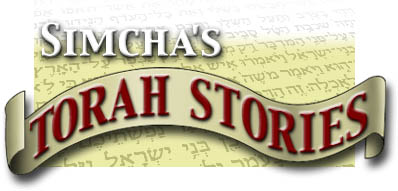Simcha's Torah Stories - Vayeitze

Parshat Vayeitze
WHAT'S IN IT FOR ME?
"Hi Jake, how are you doing?"
"Hi guys. Just fine. What's up?"
"We're on our way up to the school's library to help move and cover the books. They're going to paint the room and they need lots of help. Do you want to come?"
"Are they paying you anything to help?"
"Well, we never asked. I don't think so."
"Are they giving you free food?"
"We didn't ask about that either. We just wanted to help out."
"Are they at least putting the names of the volunteers on the bulletin board so everyone can see who they are?"
"Guess what. We didn't ask about that either."
"Well, guys have a good time."
"Does that mean that you are not coming?"
"Why should I come? They are not giving you any money, food, or recognition. What's in it for me?"
"What's in it for you, Jake?"
"That's right. What's in it for me?"
"Do you mind if I answer your question with a little story?"
"Sure. I love stories."
"Yaakov Avinu, our forefather Yaakov, went to the home of his uncle Lavan to find refuge from Eisav, his brother, and to look for a wife. He met Rachel, Lavan's daughter, and the two decided to marry. He asked Lavan for his daughter's hand in marriage. Lavan replied that he must work for seven years in order to marry Rachel. The time flies by, due to Yaakov's great love for Rachel. As the wedding day approaches, Rachel senses trouble. She knows that her father is a trickster, and may try to give her sister Leah to Yaakov as a bride. She makes up secret signals with Yaakov, so that he can identify her as the true bride. The wedding night arrives, and sure enough, Lavan comes to get Leah. Rachel is put on the spot. Should she let Leah go without giving her the secret signals? Then Lavan's devious plot will be exposed. But what about poor Leah? She will be so embarrassed. An unwanted bride. What a humiliation. Of course, she should give her the signals. But what about Rachel? She is finished. She will never marry her beloved Yaakov. Who knows whom she will marry? Perhaps his cruel brother Eisav. What should she do? What do you say Jake?"
"She should expose the plot. After all, she must worry about herself. She has her future to think about. Why should she give up a husband like Yaakov? What's in it for her?"
"That is one way of looking at it. I'll tell you what's in it for her. She saves Leah from embarrassment. Our sages tell us that it is better to be thrown into a fiery furnace than to embarrass someone. More importantly, she masters the art of self-sacrifice and giving to other people."
"That sounds interesting. Can you tell me about it?"
"Jake, there are two ways that we can relate to people. One is, 'What can I get from them?' The second way is, 'What can I give to them?'" The one who always looks at people the first way will never be truly happy or fulfilled. He is always looking to get something. His wants will never be satisfied, because he can never have everything. He will always want more than he has. And, he will dislike people who do not give him what he wants. People will not like him because they know that he only wants to take from them."
"That sounds pretty miserable."
"It is. The giver, on the other hand, is a truly happy person. He is happy with what he has because he is not always looking to get things. He only wants to help people. By giving to people, he grows to love them. And they grow close to him."
"What a beautiful thought."
"Jake, it is reality. 'What's in it for me' is a good question. Helping others without pay or recognition is the best thing that you can do for yourself. You get much more than just a little money or a free meal. You get true happiness and good relationships with people. That's what's in it for you."
"Where's the library? I'm on my way to help. Now I really see what's in it for me."
Ohr Somayach's Youth Page
General Editor: Rabbi Moshe Newman
Production Design: Michael Treblow
Dedication opportunities are available for Torah Weekly. Please contact us for details.






